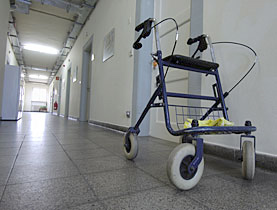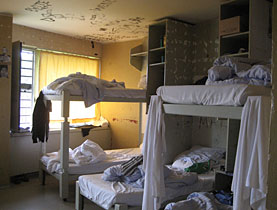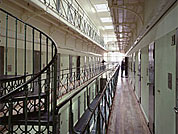More prisoners face old age behind bars

Switzerland's over-60s jail population is growing – a trend that is posing problems for the country's prisons.
Not all are equipped for aged inmates’ particular needs and building a specialised detention centre for the elderly, as already exists in Germany, may not be viable.
There are currently around 100 prisoners aged 60 or more in Switzerland, a fraction of the total prison population of almost 6,000. But their numbers are on the rise – in 1985 there were only 55.
Andrea Baechtold, a professor of criminal law and criminology at Bern University, expects another increase in the next few years and not just because the population is generally getting older.
“The most important reason is that the authorities responsible for prisoners are hesitating over allowing early release,” he told swissinfo.
Under Switzerland’s preventive detention system, an offender can be sentenced to unlimited incarceration for as long as he is deemed a risk to the public.
Serious offences
This measure is imposed in addition to the sentence for the crime. It normally applies to serious sexual or violent offences and is subject to a yearly review.
It differs from a life sentence, which in Switzerland covers a small number of crimes, such as murder.
Baechtold says that in the 1980s one person was released for each one kept in under the preventive detention system.
But the 1993 case of a sex offender who killed while on prison leave has hardened attitudes. Now only one person is released for every five incarcerated.
Many of these often middle-aged detainees are now facing a lifetime behind bars.
“Because of public opinion and media pressure, the authorities do not want to create any risk at all for the public,” said Baechtold.
Statistics for 2007 show that there are currently around 200 such prisoners in the Swiss system, with 15 joining each year.
Many challenges
The challenges posed by older inmates are manifold. Prison programmes normally aim to integrate people back into the labour market, but this makes no sense for the old, says Baechtold. They have to be prepared to deal with the social security and health system upon release.
Marcel Ruf, director of Lenzburg Prison in central Switzerland, has observed that older people often withdraw from the younger ones.
“They don’t want to spend their free time with the younger inmates and they often suffer health problems, so they can’t carry out the whole prison work programme,” Ruf told swissinfo.
Lenzburg currently has six inmates aged over 60, and 12 that are 55-60 years old. They are allowed to do less physically taxing work and there is a special exercise class. The jail also works with the Spitex organisation, which provides home care for the ill or frail.
Health issues
Geriatric health is a big issue. Lenzburg is building a specialised older persons’ wing with 12 places to open in 2011. It will have a hospital section with five beds, with facilities for dementia patients, said Ruf.
Under Swiss law, prisoners with health problems and who don’t pose a risk to society can be sent to another institution – in this case to a normal old people’s home.
The idea of spending their golden days with a convicted criminal might seem controversial to some, but Baechtold says it is a reasonable course of action if the person is not dangerous.
Some countries, such as Germany, have built specialised old people’s prisons. Ruf recently visited one in Singen in the state of Baden-Württemberg, just over the Swiss border. It has room for 50 inmates over 60.
“If you ask the inmates, they say they are glad to be there and don’t want to go back to normal prison,” said Ruf.
A Swiss solution
But he believes that it would be difficult to build such an institution in Switzerland because of its federal system, which puts the 26 cantons in charge of prisons.
“You would only need one prison for the whole of Switzerland… and until it is agreed where it would be built and who pays, it could take 15 to 20 years,” the prison director said.
Added to this is the problem of Switzerland’s many languages – a French-speaking Geneva inmate might not feel comfortable in German-speaking St Gallen – and taking people away from their social circle, says Baechtold.
Only a few prisons have so far started to address the needs of older detainees.
“I don’t think every prison is in the position to adapt its structures for older people,” Baechtold said.
“So there must be some agreement between the cantons or penal institutions on concentrating the older population in some prisons.”
swissinfo, Isobel Leybold-Johnson
Number of prisons: 115
Number of detention places: 6,654
Total prison population: 5,715
Proportion of female detainees: 5.5%
Proportion of foreign nationals: 69.7%
Source: Federal Statistics Office, 2007 data
In Switzerland there are two sets of sanctions for crimes – penalties (e.g. prison sentence) and preventive measures (such as preventive detention or therapy).
In most cases only penalties are applied. But if the person is deemed a danger to the public, a preventive measure can also be imposed.
Life sentences are imposed for a small number of crimes such as murder, hostage taking and crimes against the sovereignty of the state. A prisoner is eligible for early release after 15 years if they are no longer deemed a risk.
In 2004 Swiss voters accepted an initiative to make mandatory the lifelong incarceration of sexual and violent offenders having committed a life sentence crime (e.g. murder). This was found to be legally problematic, so parliament ruled that early release could be offered to these offenders. But the procedure for obtaining this is so sophisticated, that it is in practice not very easy.

In compliance with the JTI standards
More: SWI swissinfo.ch certified by the Journalism Trust Initiative




You can find an overview of ongoing debates with our journalists here. Please join us!
If you want to start a conversation about a topic raised in this article or want to report factual errors, email us at english@swissinfo.ch.